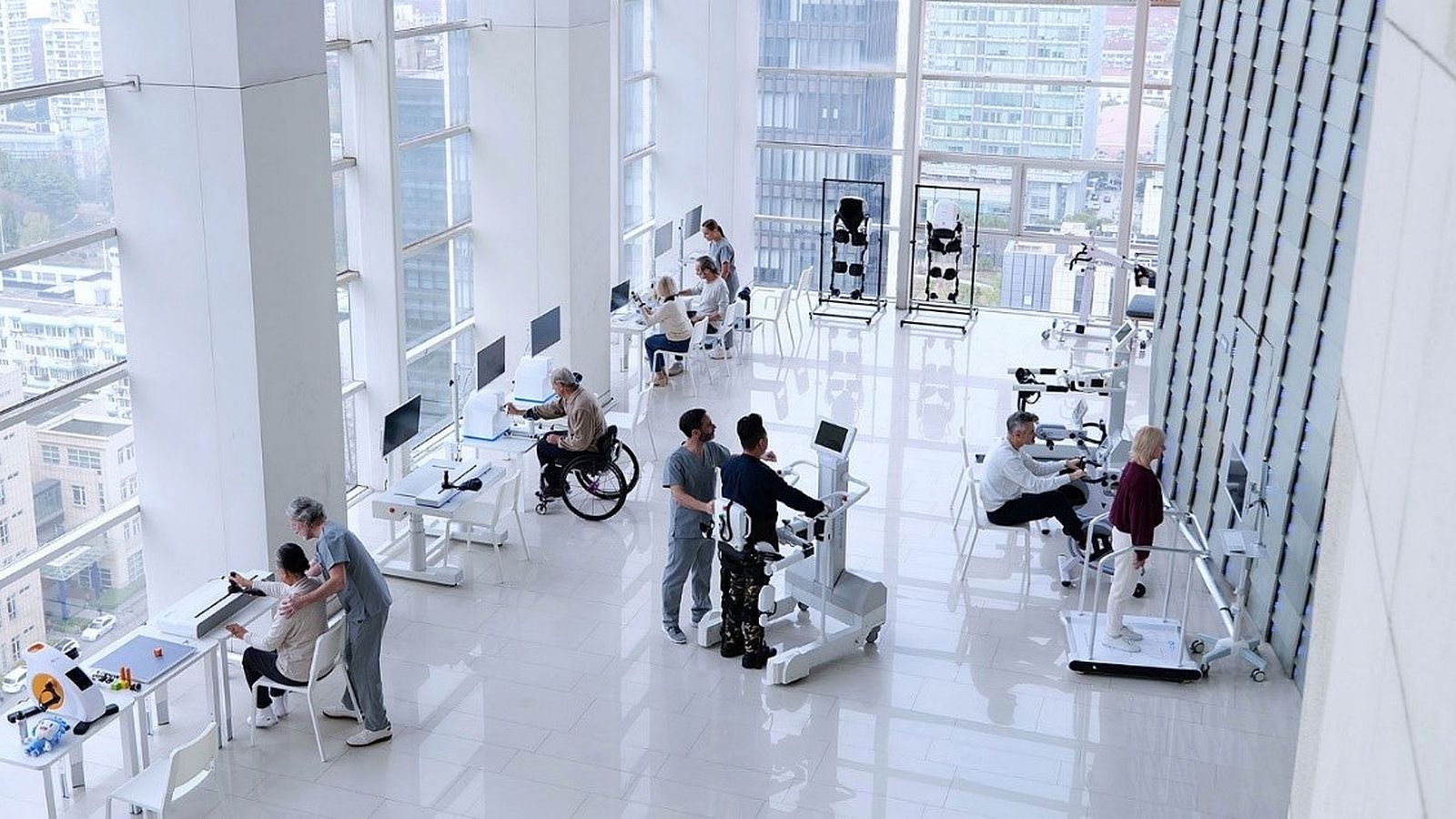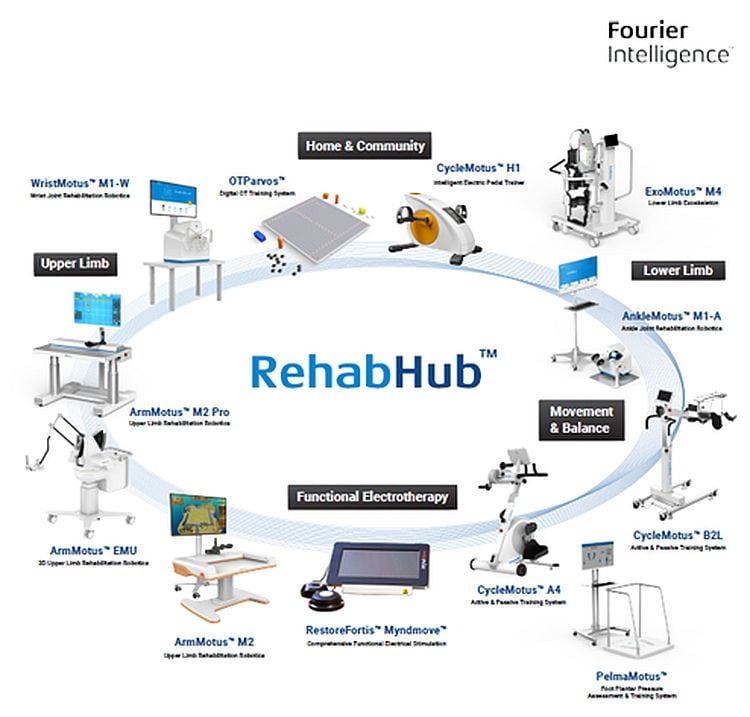
Implementing Intelligent Robotics in Geriatric Rehabilitation
Singapore United Medicare Centre
Aug 07, 2025 — With the rapid increase of the global ageing population, prone to diseases and injuries, the intervention of rehabilitation robots in the clinical environment can assist by addressing the global insufficiency of clinical therapists.
The RehabHub™ aims to create a diversified and inclusive ecosystem, enabling greater patient recovery through robotics. image copyright: Fourier Intelligence
Introducation
Globally, the WHO has estimated that over 1 billion people are affected by disabilities that impact their mobility and independence. In addition, by the year 2050, the global population of individuals aged 60 years and above is projected to reach 2.1 billion. Seeing the need to combat this rising need, the Singapore United Medicare Centre (UMC), Toa Payoh, a purpose-built nursing home opened in 2003 by then Minister for Health, Mr Khaw Boon Wan, embarked on integrating intelligent robotics and AI into its rehabilitation services. This initiative aimed to address the growing demand for quality nursing care outlined by the Ministry of Health (MOH), marking a significant step towards innovative elderly care. With the rapid increase of the global ageing population, prone to diseases and injuries, the intervention of rehabilitation robots in the clinical environment can assist by addressing the global insufficiency of clinical therapists.
Initial Problem/Task
Customer Profile:
- Industry: Healthcare (Geriatric Rehabilitation)
- Company Size: Medium-sized Nursing Home with Rehabilitation Centre
- Country: Singapore
- Challenge: Providing continuous, personalised, and intensive rehabilitation for an increasing number of elderly patients, many of whom suffered from stroke, musculoskeletal conditions, or cognitive impairments, was becoming increasingly challenging. The centre aimed to improve rehabilitation outcomes, enhance patient engagement, and alleviate the physical strain on therapists and caregivers.
Solution
What was installed:
Machine/Layout: The "RehabHub™", a suite of intelligent robotics explicitly designed for geriatric and neurorehabilitation, was introduced. It consists of upper, lower, balance and movement solutions from Fourier Rehab’s inventory of robotic devices. These solutions allow therapists to utilise advanced sensors, AI algorithms for personalised therapy, and an engaging interface for individual and group therapy sessions. In addition, the system supports ongoing research and development in rehabilitative technology. With its ability to collect and analyse large volumes of data, the RehabHub™ provides valuable insights that can be used to refine existing therapies and develop new ones.
Why This Solution: The RehabHub™ was chosen for its ability to adapt exercises in real-time based on patient performance, provide motivational feedback, and support a wide range of rehabilitation activities. It is a versatile tool that allows healthcare providers to cater to different patient needs, allowing for effective and comprehensive rehabilitative care and making it a one-stop solution for patients. Catering for upper, lower, movement and balance, patients who require attention in different areas can entirely focus on their recovery journey without being required to travel to multiple locations to receive various treatments. Whether a patient is recovering from a neurological event, such as a stroke, or managing age-related physical decline, it provides a unified platform that accommodates an expansive array of therapeutic exercises.
Implementation Timeline: The solution was implemented within three months, including setup, clinical staff training, and full integration into the daily rehabilitation programs.
Evaluation
Benefits:
Enhanced Rehabilitation Outcomes: The introduction of the RehabHub™ has marked a transformative shift in the landscape of rehabilitative care, particularly in enhancing patient outcomes across several crucial domains: mobility, balance, and cognitive functions. The improvements observed in these areas can be attributed mainly to the system's AI-driven, personalised, and adaptive approach to therapy, providing therapists with crucial information on the patient's mobility and range of motion, which allows for highly adaptable rehab protocols and treatments for different needs.
Increased Patient Engagement: The devices within the hub significantly boosted patient motivation and satisfaction, making the rehabilitation process more appealing. Implementing gamified therapy allows patients to be highly engaged throughout their sessions. As traditional therapy methods involve patients doing repetitive and non-engaging tasks, gamified therapy, incorporated into each device within the hub, gives patients motivation and satisfaction during and after individual sessions. The system helps sustain patient interest and enthusiasm throughout recovery by transforming rehabilitation exercises into engaging challenges. This increased engagement is crucial as it makes patients look forward to their therapy sessions and deeply involves them in the activities. As a result, they are more likely to adhere to their therapy regimen and less likely to abandon it.
Reduced Physical Strain on Therapists and Caregivers: By automating many of the repetitive and labour-intensive tasks associated with rehabilitation, RehabHub™ has revolutionised the role of healthcare professionals, enabling them to focus on more complex and nuanced aspects of patient care. These tasks, such as assisting patients with exercises or manually recording patient movements, can lead to physical strain and fatigue among healthcare workers. With the burden of repetitive tasks lifted, therapists and caregivers can redirect their energies towards more complex elements of rehabilitation care. This includes developing personalised care plans, monitoring patient progress with greater detail, and engaging in direct patient interaction focusing on psychological and emotional support. The ability to concentrate on these areas enhances the quality of care provided and allows for a more holistic approach to patient rehabilitation.
Contribution of AI and Digitalisation:
AI Algorithms: AI algorithms serve as the backbone of the RehabHub™, playing an indispensable role in revolutionising rehabilitation care. These advanced algorithms are essential to deeply analysing patient data, allowing for customised therapy sessions tailored to each patient's needs and response patterns. This capability of making real-time adjustments based on patient responses enhances the efficacy of treatments and significantly improves patient outcomes. Designed to process a vast array of data points collected during therapy sessions, including movement precision and patient feedback, the AI can analyse these data and identify patterns and nuances in a patient's progress and struggles, which might be overlooked in a less sophisticated setup.
Digitalisation: The digitalisation features of the hub play a pivotal role in modernising rehabilitation practices. A vital aspect of this technology is its ability to facilitate seamless patient data integration with a centre’s Electronic Health Records (EHR). Through InfinityNet™, a cloud-based system that links all devices within the RehabHub™, this capability promotes a holistic approach to patient care and significantly enhances the rehabilitation process's efficiency and effectiveness. Automating the data entry process reduces the likelihood of manual errors and increases data management efficiency in rehabilitation settings. Minimising the need for handwritten notes and manual record-keeping saves time and reduces the potential for errors in the transcription and handling of physical documents. This leads to a more reliable and streamlined process, allowing therapists to spend more time with patients rather than on administrative tasks.

Conclusion
The successful integration of intelligent robotics and AI at the Singapore United Medicare Centre's rehabilitation facility demonstrates the transformative potential of these technologies in the geriatric healthcare sector. The RehabHub™ effectively addressed the specific challenges of geriatric care, offering a scalable, efficient, and engaging rehabilitation solution. This case study serves as a model for how innovative approaches can fulfil the needs of an ageing population, ensuring high-quality care and boosting the capabilities of healthcare providers in an increasingly digital world. Robot-assisted therapy has freed up the labour-intensive, repetitive work from the therapist, allowing them to focus on work that requires their professional knowledge, like therapy planning, prescription, and dexterous manual therapy that a robot cannot replicate. By doing that, a therapist's work efficiency has been maximised, offering more treatment sessions to the continually increasing patient populations.


